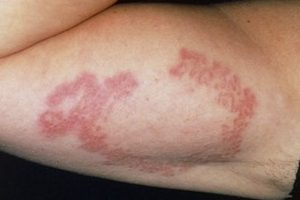Eczema is a skin condition that affects millions of people worldwide. It is characterized by dry, itchy, and inflamed skin that can be uncomfortable and even painful. While there are many treatments available for eczema, natural remedies have gained popularity in recent years due to their effectiveness and lack of harsh chemicals.
In this article, we will explore the benefits of natural treatments for eczema and discuss some of the most popular remedies.
What is Eczema?
 Eczema, also known as atopic dermatitis, is a chronic skin condition that causes inflammation and irritation. It can occur anywhere on the body but is most commonly found on the hands, feet, face, and neck. Eczema can be caused by a variety of factors, including genetics, environmental triggers, and immune system dysfunction.
Eczema, also known as atopic dermatitis, is a chronic skin condition that causes inflammation and irritation. It can occur anywhere on the body but is most commonly found on the hands, feet, face, and neck. Eczema can be caused by a variety of factors, including genetics, environmental triggers, and immune system dysfunction.
There are several types of eczema, including atopic dermatitis (the most common type), contact dermatitis (caused by exposure to irritants or allergens), and nummular dermatitis (characterized by circular patches of irritated skin). Symptoms of eczema include dryness, itching, redness, swelling, and cracking.
Benefits of Natural Treatments for Eczema
Natural treatments for eczema offer several benefits over traditional treatments. First and foremost, they avoid the use of harsh chemicals that can further irritate sensitive skin. Additionally, natural remedies are often more cost-effective than prescription medications or over-the-counter creams. Finally, many natural remedies are readily available at home or in health food stores.
Oatmeal Baths for Eczema
Oatmeal baths are a popular natural remedy for eczema due to their ability to soothe irritated skin. Oatmeal contains compounds called avenanthramides that have anti-inflammatory properties and can help reduce itching and redness.
To prepare an oatmeal bath, simply grind one cup of plain, uncooked oatmeal into a fine powder and add it to a warm bath. Soak in the bath for 15-20 minutes, then rinse off with warm water. Be sure to moisturize your skin immediately after the bath to lock in moisture.
It is important to note that oatmeal baths may not be suitable for everyone. If you have a gluten allergy or sensitivity, be sure to use certified gluten-free oatmeal. Additionally, if you experience any adverse reactions such as increased itching or redness, discontinue use.
Coconut Oil for Eczema
Coconut oil is another popular natural remedy for eczema due to its moisturizing and anti-inflammatory properties. It contains lauric acid, which has been shown to reduce inflammation and improve skin barrier function.
To use coconut oil for eczema, simply apply a small amount to the affected area and massage gently until absorbed. You can also mix coconut oil with other natural remedies such as aloe vera or chamomile for added benefits.
It is important to note that coconut oil may not be suitable for everyone. If you have a coconut allergy or sensitivity, do not use this remedy. Additionally, be sure to patch test before using coconut oil on larger areas of skin.
Other Natural Treatments for Eczema
In addition to oatmeal baths and coconut oil, there are several other natural remedies that can help soothe eczema symptoms. Aloe vera contains compounds that can reduce inflammation and promote healing, while chamomile has anti-inflammatory and anti-itch properties. Tea tree oil has antimicrobial properties that can help prevent infection, and honey has antibacterial properties that can help reduce inflammation.
To use these remedies, simply apply them topically to the affected area or add them to a warm bath. Be sure to patch test before using on larger areas of skin.
Tips for Managing Eczema at Home
In addition to natural remedies, there are several things you can do at home to manage eczema symptoms. First and foremost, it is important to moisturize regularly to prevent dryness and itching. Avoiding triggers such as harsh soaps, fragrances, and certain foods can also help reduce symptoms. Wearing comfortable clothing made from soft, breathable fabrics can prevent irritation, and keeping nails short can prevent scratching.
When to See a Doctor for Eczema
While natural remedies can be effective for managing eczema symptoms, it is important to consult a doctor if you experience severe symptoms such as bleeding or oozing skin, signs of infection such as fever or pus, or if your symptoms do not improve with natural treatments. Your doctor may recommend prescription medications or other treatments to help manage your eczema.
Natural remedies offer several benefits for managing eczema symptoms, including avoiding harsh chemicals and being cost-effective. Oatmeal baths and coconut oil are two popular remedies that can help soothe irritated skin, while aloe vera, chamomile, tea tree oil, and honey offer additional benefits. It is important to consult a doctor if you experience severe symptoms or if your symptoms do not improve with natural treatments.








